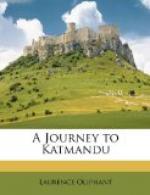Two winged lions guard the chief bridge over the Bhagmutty, by which Katmandu is approached, and pronounce Bheem Singh its builder. Numerous temples and handsome palaces are adorned in like manner, but the monument above mentioned is the most remarkable memorial of his greatness, and is the chief ornament of the city. The people are deservedly proud of this its distinguishing mark, for, except as minarets, single columns are unknown in India, and in this respect their mountain capital can boldly challenge a comparison with the proudest city of the plains. The monument resembles in shape a portable telescope fully drawn out, and rears its head to a height of nearly 200 feet above the surrounding houses. The Minister Sahib contended that it was higher than the monument of London. This, as in duty bound, I patriotically denied; but which of us was led into error by partiality for our respective countries I am not prepared to say. The Mahila Sahib accompanied us to the summit, whence we had a most magnificent view. Looking down into the city beneath us, we could discern the turning of every narrow street, the palaces situated in the midst of gardens, the hovels in the midst of dunghills, though I am bound to say that the former preponderated in number, and the houses of the city were for the most part substantial and well built. Some of these streets were now crowded with a motley multitude, returning home from the review, the bright uniforms mixing amongst them as the soldiers joined their families after being dismissed parade, or here and there marched in companies back to the barracks. Officers were scampering down streets on ponies, dragging along the horse boys, who were holding on by their tails. All this the Mahila Sahib pointed out with much affability. Had he been the man to seize a good opportunity, that was the moment to give Jung a push over the low parapet; but the Mahila Sahib is a man without decision of character; so we all descended, and he allowed the minister to reach the bottom his own way. We then proceeded with Jung to his residence, there to partake of a farewell feast. The carriage in which we were driving was one I had seen brought over the mountain passes on men’s shoulders in detached portions; and this emanation from Long-Acre was to be trundled for the rest of its existence along the three or four miles of carriage-road which the valley of Nepaul can boast. Our way lay through narrow lanes, walled in by the enclosures of different rich men’s suburban residences, and the prolific orange-trees drooped their luscious fruit over the garden walls for the benefit of any one who chose to pick them, as they hung temptingly overhead. Jung showed us his horticultural arrangements with no little pride. His house is situated in the midst of gardens, adorned with fountains and reservoirs, and he informed us that upon one aqueduct alone he had expended 30,000 pounds. The garden was in its infancy, and, notwithstanding the great formality




